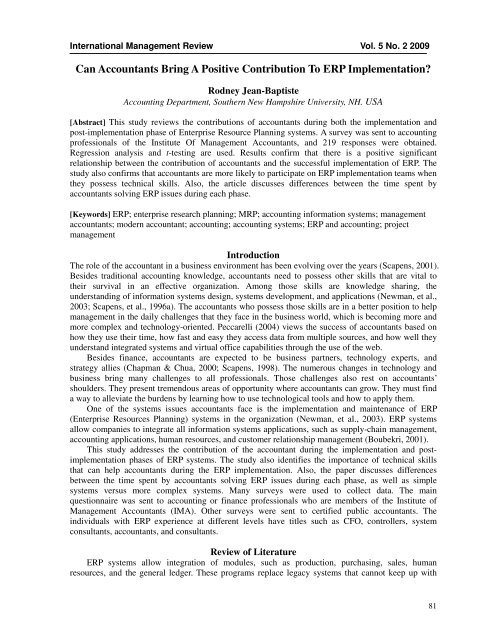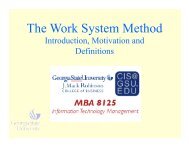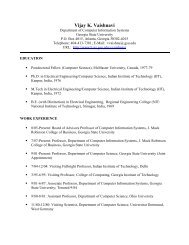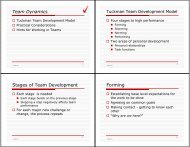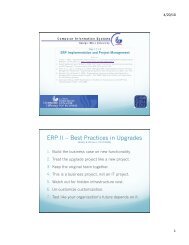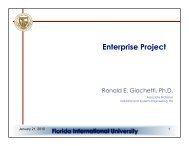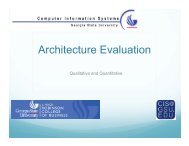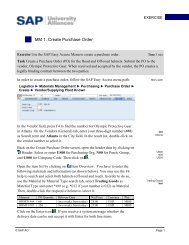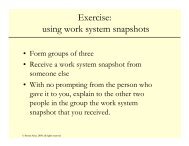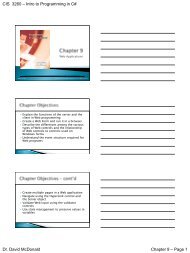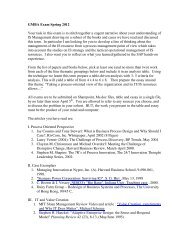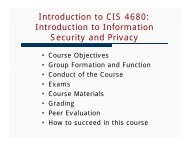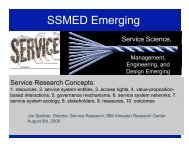Can Accountants Bring A Positive Contribution To ERP ...
Can Accountants Bring A Positive Contribution To ERP ...
Can Accountants Bring A Positive Contribution To ERP ...
Create successful ePaper yourself
Turn your PDF publications into a flip-book with our unique Google optimized e-Paper software.
International Management Review Vol. 5 No. 2 2009<br />
<strong>Can</strong> <strong>Accountants</strong> <strong>Bring</strong> A <strong>Positive</strong> <strong>Contribution</strong> <strong>To</strong> <strong>ERP</strong> Implementation?<br />
Rodney Jean-Baptiste<br />
Accounting Department, Southern New Hampshire University, NH. USA<br />
[Abstract] This study reviews the contributions of accountants during both the implementation and<br />
post-implementation phase of Enterprise Resource Planning systems. A survey was sent to accounting<br />
professionals of the Institute Of Management <strong>Accountants</strong>, and 219 responses were obtained.<br />
Regression analysis and t-testing are used. Results confirm that there is a positive significant<br />
relationship between the contribution of accountants and the successful implementation of <strong>ERP</strong>. The<br />
study also confirms that accountants are more likely to participate on <strong>ERP</strong> implementation teams when<br />
they possess technical skills. Also, the article discusses differences between the time spent by<br />
accountants solving <strong>ERP</strong> issues during each phase.<br />
[Keywords] <strong>ERP</strong>; enterprise research planning; MRP; accounting information systems; management<br />
accountants; modern accountant; accounting; accounting systems; <strong>ERP</strong> and accounting; project<br />
management<br />
Introduction<br />
The role of the accountant in a business environment has been evolving over the years (Scapens, 2001).<br />
Besides traditional accounting knowledge, accountants need to possess other skills that are vital to<br />
their survival in an effective organization. Among those skills are knowledge sharing, the<br />
understanding of information systems design, systems development, and applications (Newman, et al.,<br />
2003; Scapens, et al., 1996a). The accountants who possess those skills are in a better position to help<br />
management in the daily challenges that they face in the business world, which is becoming more and<br />
more complex and technology-oriented. Peccarelli (2004) views the success of accountants based on<br />
how they use their time, how fast and easy they access data from multiple sources, and how well they<br />
understand integrated systems and virtual office capabilities through the use of the web.<br />
Besides finance, accountants are expected to be business partners, technology experts, and<br />
strategy allies (Chapman & Chua, 2000; Scapens, 1998). The numerous changes in technology and<br />
business bring many challenges to all professionals. Those challenges also rest on accountants’<br />
shoulders. They present tremendous areas of opportunity where accountants can grow. They must find<br />
a way to alleviate the burdens by learning how to use technological tools and how to apply them.<br />
One of the systems issues accountants face is the implementation and maintenance of <strong>ERP</strong><br />
(Enterprise Resources Planning) systems in the organization (Newman, et al., 2003). <strong>ERP</strong> systems<br />
allow companies to integrate all information systems applications, such as supply-chain management,<br />
accounting applications, human resources, and customer relationship management (Boubekri, 2001).<br />
This study addresses the contribution of the accountant during the implementation and postimplementation<br />
phases of <strong>ERP</strong> systems. The study also identifies the importance of technical skills<br />
that can help accountants during the <strong>ERP</strong> implementation. Also, the paper discusses differences<br />
between the time spent by accountants solving <strong>ERP</strong> issues during each phase, as well as simple<br />
systems versus more complex systems. Many surveys were used to collect data. The main<br />
questionnaire was sent to accounting or finance professionals who are members of the Institute of<br />
Management <strong>Accountants</strong> (IMA). Other surveys were sent to certified public accountants. The<br />
individuals with <strong>ERP</strong> experience at different levels have titles such as CFO, controllers, system<br />
consultants, accountants, and consultants.<br />
Review of Literature<br />
<strong>ERP</strong> systems allow integration of modules, such as production, purchasing, sales, human<br />
resources, and the general ledger. These programs replace legacy systems that cannot keep up with<br />
81
International Management Review Vol. 5 No. 2 2009<br />
current business requirements. Instead of having many stand-alone modules, data can be entered once,<br />
and the relative impact on other modules is reflected immediately. The <strong>ERP</strong> is an improvement of<br />
MRP (Material requirements planning) models that did not contain modules, such as human resource<br />
management and customer management. <strong>ERP</strong> implementation must be managed as a program of broad<br />
organizational change rather than a software implementation (Markus & Tanis, 2000; Somers, et al.,<br />
2001). “<strong>ERP</strong> implementations usually require people to create new work relationships, share<br />
information that was once closely guarded, and make business decisions they never were required to<br />
make” (Appleton, 1997, p. 2). This information sharing remains an important element that most of the<br />
key players, including accountants, need to cultivate to attain a successful implementation.<br />
The role of accountants remains important during both the implementation and postimplementation<br />
stages of <strong>ERP</strong> systems. Many authors agree that accountants are key players in <strong>ERP</strong>.<br />
Mische (2000) lists the Big Six (now Big Four) public accounting firms among the key providers of<br />
consulting services in <strong>ERP</strong> for large companies. The rationale remains that accountants possess the<br />
expertise to understand one of the end-results of <strong>ERP</strong>, which is the ability to easily and automatically<br />
transfer information to the general ledger that ultimately results in generation of financial statements.<br />
Unfortunately, consulting fees for these outside accountants are very high, and companies are looking<br />
for alternatives. One of the viable alternatives is to persuade internal accountants to acquire adequate<br />
skills through extensive training and to share their core financial knowledge to assist is the<br />
implementation process.<br />
The integration of <strong>ERP</strong> poses both opportunities and threats for management accountants<br />
(Scapens, 1998). The author also discusses centralization and decentralization in terms of the degree of<br />
controls of management accountants in <strong>ERP</strong>. By centralization, he portrays a team of information<br />
specialists who control processing functions. The centralization may also be controlled by accountants,<br />
since they act as systems specialists in many companies. This phenomenon is one of the most<br />
important elements of this study. Many small-to-medium-sized firms with less sophisticated or smaller<br />
<strong>ERP</strong> systems use accountants as their systems specialists. Sometimes, the controller is also the chief<br />
information officer (CIO) or the IT leader.<br />
Furthermore, although the control of the <strong>ERP</strong> is effectuated by IT specialists in most companies,<br />
accountants still play a role in the design and initial steps of those controls. Scapens (1998) finds that<br />
the main advantage of accountants is their financial expertise. “But this advantage could be lost to<br />
other information specialists if management accountants do not fully recognize the potential of<br />
integrated information systems and the opportunities for business support which they open up for<br />
management accountants” (p. 3). Chapman and Chua (2000) echo Scapens’ findings by seeing the<br />
decentralization of <strong>ERP</strong> as an opportunity for accountants. They consider those <strong>ERP</strong>-type technologies<br />
as a medium to “unbundled” activities into specialist units and that such shared services are subject to<br />
outsourcing. They also found that management accounting area as one of the largest growth areas in<br />
outsourcing activity.<br />
Hypothesis Development and Methodology<br />
The theoretical framework is based on the contribution of accountants to <strong>ERP</strong> systems. By evaluating<br />
the requirements of <strong>ERP</strong> systems and the role of the modern accountant, the following hypotheses<br />
have been proposed:<br />
H 1 : There is a positive relationship between the successful implementation of <strong>ERP</strong> systems and<br />
the participation of accountants in the implementation of <strong>ERP</strong> systems.<br />
The variable successful implementation could be interpreted differently by different organizations.<br />
Generally, it would mean a reasonable implementation time. Another measure of successful<br />
implementation is the extent of the integration of all modules, which saves the company time and<br />
money. Most importantly, successful implementation would mean that people work together and make<br />
82
International Management Review Vol. 5 No. 2 2009<br />
better and quicker business decisions (Appleton, 1997). The variable participation relates to the<br />
contribution of accountants during the implementation of <strong>ERP</strong>. The accountant may also recommend a<br />
specific <strong>ERP</strong> package that satisfies the company’s financial reporting requirements. During the postimplementation<br />
period, accountants are usually involved in finding solutions to problems caused by<br />
the shortcomings and limitations of the <strong>ERP</strong> systems. They participate in users’ groups with the<br />
developers to find solutions. They also create front-end solutions, such as report writings in tools such<br />
as Excel, SQL, MS Access, Crystal Report, and FRX.<br />
Two testing methods are used for Hypothesis 1. Each method looks at the hypothesis at different<br />
angles. The first one is the Pearson Correlation to compare successful implementation with the<br />
importance of accountants’ participation question. It shows the degree to which successful<br />
implementation of <strong>ERP</strong> systems and participation of accountants are related. The value of “r” ranges<br />
from -1 to +1. When the relation is positive, “r” is greater than zero. The second method uses linear<br />
regression analysis, comparing successful implementation with accountants’ participation.<br />
H 2 : There is a difference between the time spent by accountants in solving <strong>ERP</strong> issues during<br />
the implementation phase and the time spent by accountants in solving <strong>ERP</strong> issues during the<br />
post-implementation phase.<br />
The time spent by accountants means the degree to which accountants perform specific tasks during<br />
each stage. It could relate to the number of activities accountants undertake or to the significance or<br />
importance of the activities to which they participate. During the implementation phase, variable refers<br />
the starting exercise of installing an <strong>ERP</strong> system. It includes all of the effort necessary to put the<br />
system into use. It includes installation, testing, and debugging. The post-implementation phase<br />
variable is the period after the system has been installed and implemented successfully but still needs<br />
to maintain and improve the system. While accountants are needed for both phases, there may be a<br />
stage in which the role of accountants is more crucial. Although many support the idea that the postimplementation<br />
phase is where accountants help the most, there is not enough evidence to have a onetail<br />
model. This relation remains a two-tail t test, since the hypothesis states only the fact that there is a<br />
difference but does not specify which phase has a higher degree of accountants’ participation.<br />
One-sample t test is used to find the relationship between the two stages. The test looks for a<br />
significant difference in the contribution of accountants in condition 1 (implementation phase) and<br />
condition 2 (post-implementation phase).<br />
H 3 : There is a positive relationship between accountants who possess technical or IT skills in<br />
addition to their financial expertise and their acceptance to <strong>ERP</strong> teams during the<br />
implementation phase.<br />
H 4 : There is a positive relationship between accountants who possess technical or IT skills in<br />
addition to their financial expertise and their acceptance to <strong>ERP</strong> teams during the postimplementation<br />
phase.<br />
Technical or IT skills include moderate-to-advanced understanding of electronic spreadsheets,<br />
knowledge of integrated systems, and the use of the web (Peccarelli, 2004). Many accountants also<br />
possess database and report-writing skills.<br />
H 5 : There is a difference between the <strong>ERP</strong> involvement of accountants in smaller<br />
organizations that use an <strong>ERP</strong> system supported by many sub-systems and companies that use<br />
a sole <strong>ERP</strong> system with fewer or no sub-systems during the implementation phase.<br />
H 6 : There is a difference between the <strong>ERP</strong> involvement of accountants in smaller<br />
organizations that use an <strong>ERP</strong> system supported by many sub-systems and companies that use<br />
a sole <strong>ERP</strong> system with fewer or no sub-systems during the post-implementation or<br />
maintenance phase.<br />
83
International Management Review Vol. 5 No. 2 2009<br />
A paired t test method is used to find the relationship between the two combinations. The test looks for<br />
a significant difference in the contribution of accountants in condition 1 (one system) and condition 2<br />
(many systems). Since only two variables are measured, the paired t test is a very good method to find<br />
relationships and differences between the two phases (Willoughby, 1996).<br />
Sample Selection<br />
The main survey was sent to accounting professionals with <strong>ERP</strong> experience in the Institute of<br />
Management Accountant (IMA). The IMA staff included a short synopsis of the topic and a link to the<br />
online survey in the October 18, 2005 issue of their e-newsletter (IMA Online News). This is an e-<br />
newsletter that goes to all current members that have a valid email address in IMA’s database. The<br />
sample of members’ e-mails was not disclosed; all members had access to the link. A specific title:<br />
“For accounting or finance professionals with <strong>ERP</strong> experience” was added to the synopsis that<br />
requests only those individuals to respond to the survey, but there was no control over who did or did<br />
not take it. However, the survey had many controls, such as the prevention of duplicate answers per<br />
computer. The newsletter goes to approximately 50,000 members. The IMA has more than 80,000<br />
members worldwide, many of whom hold professional designation such as CPA, CIA, CMA, and<br />
CFM. The last two designations, CMA and CFM, are offered by the IMA itself. Forty-five additional<br />
surveys were sent to certified public accountants outside of the IMA membership in September 2008.<br />
Twenty-one of these professionals responded. The results obtained from the CPAs were consistent<br />
with the responses of the IMA members.<br />
Data Collection and Analysis<br />
The survey used in this study contains several demographic questions. Two hundred nineteen<br />
responses were obtained, of which 212 were complete and 7 partial. Only complete answers are<br />
included in the study. All 212 respondents stated they were either <strong>ERP</strong> users or implementers.<br />
Respondents were asked to select the characteristics or skills that they would most likely use during<br />
the implementation and post-implementation phase of <strong>ERP</strong>. As expected, financial expertise ranked<br />
number one at 84%. Among the skills accountants can bring to the organization, the respondents<br />
picked financial expertise as their major input. Knowledge sharing and business skills are almost tied<br />
with a respective rating of 66% and 65%.<br />
The respondents believe that the ability to share knowledge and to understand the business issues<br />
remains an important factor to succeed in <strong>ERP</strong>. Table 1 illustrates their responses during the<br />
implementation phase. A couple points below comes technical skill. It is rated as an important factor,<br />
as well. Surprisingly, experience with <strong>ERP</strong> implementation is not selected by the majority of the<br />
respondents. Only 45% of the respondents had experience with <strong>ERP</strong> implementation. This indicates<br />
that experience with <strong>ERP</strong> experience is not necessarily a prime requirement for accountants as<br />
compared to their financial, knowledge sharing, business, and technical skills. Objectivity and others<br />
occupied the bottom of the Table 1.<br />
Table 1. Frequencies and Percentages of <strong>Accountants</strong> <strong>Contribution</strong> During the Implementation Phase<br />
<strong>Contribution</strong> # of Responses Percentage Rank<br />
Financial Expertise 178 84% 1<br />
Knowledge Sharing 140 66% 2<br />
Business skills 138 65% 3<br />
Technical skills 133 63% 4<br />
Objectivity 43 20% 6<br />
Experience with <strong>ERP</strong> implementation 95 45% 5<br />
Other, Please Specify 10 5% 7<br />
* Since multiple choices were allowed, the total percentage exceeds 100%<br />
84
International Management Review Vol. 5 No. 2 2009<br />
Post-Implementation Phase<br />
During the post-implementation phase, the skills listed were not the same as the implementation phase.<br />
Table 2 includes the answers for the post-implementation phase. Some of the accountants’<br />
contributions are unique to the post-implementation phase, such as participation in users’ groups,<br />
report writing, and database management, whereas financial expertise, business, and technical skills<br />
can be exercised in both phases.<br />
Financial expertise keeps the highest mark of 86%, two points higher than the implementation<br />
phase. It is expected that financial expertise is more evident in the post-implementation phase, since<br />
most of the <strong>ERP</strong> problems, such as the integration with the general ledger, appear in the maintenance<br />
phase. Business skill jumps from 66% to 70%. This change also makes sense. Business skills are<br />
needed to select an <strong>ERP</strong> package. One must know the problems that the organization faces before<br />
choosing <strong>ERP</strong> software. However, in the maintenance phase, this is where users face reality. This is<br />
the time to fill customer orders on-time, to prevent inventory shortage and avoid inventory overage,<br />
and to make other key business decisions. Knowledge sharing slightly rises to 67%. Report writing<br />
gets a noticeable mark of 54%. More than half of the respondents were involved in report-writing<br />
functions. Many of the <strong>ERP</strong> systems provide flexibility for users to write reports. <strong>Accountants</strong> use this<br />
tool to write customized reports to satisfy management needs and for decision-making.<br />
Table 2. Frequencies and Percentages of <strong>Accountants</strong>’ <strong>Contribution</strong> during the Post-Implementation Phase<br />
<strong>Contribution</strong> # of Responses % Rank<br />
Financial Expertise 183 86% 1<br />
Participation to users’ group of <strong>ERP</strong> developers 72 34% 6<br />
Report writing 114 54% 4<br />
Ethical behavior 56 26% 7<br />
Participate to programming of XBRL 11 5% 11<br />
Participate in the acquisition of Sarbanes-Oxley (SOX) s/w 30 14% 10<br />
Database management 74 35% 5<br />
Knowledge sharing 143 67% 3<br />
Business skills 149 70% 2<br />
Other technical skills 49 23% 8<br />
Objectivity 45 21% 9<br />
Other, Please Specify 6 3% 12<br />
*Since multiple choices were allowed, the total percentage exceeds 100%.<br />
Table 3 compares a simpler <strong>ERP</strong> system to a complex system. Respondents agree that a simpler<br />
system is more likely to succeed.<br />
Table 3. Comparison of <strong>ERP</strong> System Combination and Successful Implementation<br />
**Based on a scale of 1 to 6 with 1 being strongly disagree and 6 strongly agree<br />
Number of responses 1 2 3 4 5 6<br />
<strong>To</strong>tal 203 1 6 26 102 62 6<br />
One <strong>ERP</strong> system with few or no subsystems<br />
129 1 4 22 66 31 5<br />
One or many <strong>ERP</strong> systems with many<br />
sub-systems 74 0 2 4 36 31 1<br />
85
International Management Review Vol. 5 No. 2 2009<br />
Table 4 explains the respondents’ opinions on why <strong>ERP</strong> implementation a success.<br />
Table 4. Why <strong>ERP</strong> System Implementation as a Success<br />
Count Percentage<br />
Shorter implementation time 57 28%<br />
Successful integration of all modules 140 69%<br />
Faster business transactions processing 126 62%<br />
People working together 139 68%<br />
Other 12 6%<br />
Hypothesis Testing<br />
This section tests the various hypotheses that were presented earlier. The hypotheses using regression<br />
analysis are discussed first. The variables used are successful <strong>ERP</strong> implementation and accountants’<br />
contributions. This latter is a dichotomous variable that can take the value of “0” or “1.” The<br />
regression equation is:<br />
Y= a+ BX or Y= 3.286 + .895X.<br />
It can also be expressed as the following:<br />
Successful <strong>ERP</strong> implementation = 3.286 + .895<strong>Accountants</strong>’contibution (1)<br />
This means the value of successful <strong>ERP</strong> implementation will be at least 3.286. This number<br />
exceeds the midpoint value of 3; as a result, the relation is positive. Since the value of X is positive,<br />
the value of Y cannot be less than 3.286. When accountants contribute, the value of X should be 1; as a<br />
result, Y becomes 4.181 (3.286 + .895). In other words, when accountants contribute to <strong>ERP</strong>, the mean<br />
becomes 4.181, which is a positive relationship as the research hypothesis indicates. Also, the<br />
regression model is significant at .05, which means the research hypothesis can be confirmed.<br />
Technical skill is significant during the implementation phase.<br />
The regression equations are the following:<br />
H 1 : Successful <strong>ERP</strong> implementation = 3.286 + .895<strong>Accountants</strong>’contibution (1)<br />
H 3 : Technical skills team = 3.822 + .428Technical skills implementation (2)<br />
H 4 : Technical skills team = 4.129 -.069Technical skills maintenance (3)<br />
Table 5. Hypothesis testing summary<br />
Hypothesis Testing Model Constant B t Sig.<br />
H1 <strong>Accountants</strong>' contribution to <strong>ERP</strong> Regression analysis 3.286 0.895 2.833 0.005<br />
H1 <strong>Accountants</strong>' contribution to <strong>ERP</strong> Pearson Correlation - - - 0.000<br />
H2 Difference between phases One sample t-test - - - 0.000<br />
H3<br />
Technical skills in <strong>ERP</strong><br />
implementation Teams Regression analysis 3.822 0.428 3.03 0.003<br />
H4<br />
Technical skills in <strong>ERP</strong> maintenance<br />
Teams Regression analysis 4.129 0.069 -0.495 0.621<br />
H5<br />
One system versus many systems in<br />
implementation Paired sample t-test - - -0.955 0.349<br />
H6<br />
One system versus many systems in<br />
maintenance Paired sample t-test - - 2.739 0.011<br />
86
International Management Review Vol. 5 No. 2 2009<br />
Table 6. Summary of Results<br />
Hypothesis Hypothesis Null Hypothesis<br />
Research<br />
Hypothesis<br />
1 Relationship between success of <strong>ERP</strong> implementation and<br />
accountants’ contributions Rejected Accepted<br />
2 Difference between time spent by accountants by phase Rejected Accepted<br />
3 Relationship between the acceptance to <strong>ERP</strong> teamsimplementation<br />
and technical skills Rejected Accepted<br />
4 Relationship between the acceptance to <strong>ERP</strong> teams-maintenance<br />
and technical skills Accepted Rejected<br />
5 Difference of accountants’ contributions between one system<br />
and many systems - implementation Accepted Rejected<br />
6 Difference of accountants’ contributions between one system<br />
and many systems – maintenance Rejected Accepted<br />
Results, Conclusions, and Recommendations<br />
Hypothesis 1 states that there is a positive relationship between successful implementation of <strong>ERP</strong><br />
systems and the participation of accountants. Regression analysis and Pearson correlation show a<br />
significant and positive relation between the two variables; as a result, research hypothesis 1 is<br />
supported. This hypothesis is proved by two different methods and two different sets of variables. One<br />
variable is the participation of accountants in <strong>ERP</strong> and the second the assessment of accountants’<br />
usefulness in <strong>ERP</strong> implementation team. This result parallels Scapens (1998) and Chapman and Chua<br />
(2000), who portray the positive role of accountants in systems and IT issues. Because of this<br />
relationship, as Mische (2000) puts it, Big 4 CPA firms will be key providers of consulting services for<br />
<strong>ERP</strong> implementation for many companies.<br />
Hypothesis 2 addresses the difference between the time spent by accountants during the<br />
implementation phase and time spent by accountants during the maintenance phase. The one-sample t<br />
test proves there is a significant difference; thus, Hypothesis 2 is confirmed. This is a two-tailed testing<br />
where the phase that holds the most amount of time spent is ignored. The result is to find whether or<br />
not a difference exists. However, descriptive statistics prove a domination of the implementation phase.<br />
If the implementation phase prevails, in a way, this would mean that the implementation time was<br />
longer not shorter. This could also mean that the <strong>ERP</strong> implementation was somewhat successful if<br />
accountants spent less time dealing with <strong>ERP</strong> issues after implementation.<br />
This assumption was satisfied by descriptive statistics, which show a majority of respondents<br />
giving a favorable rating to their <strong>ERP</strong> implementation. However, this result can be challenged when<br />
one considers the aggregate time spent by accountants over the years in solving maintenance issues,<br />
such as report writing, database management, integration of modules, and changes of business<br />
operations. Descriptive statistics demonstrate that those who spend more time solving <strong>ERP</strong> issues<br />
during the maintenance phase have a more complex <strong>ERP</strong> system, a finding that makes perfect sense.<br />
Hypotheses 3 and 4 examine the positive relationship between accountants who possess technical<br />
skills in addition to their financial expertise and their acceptance to <strong>ERP</strong> teams during the<br />
implementation and maintenance phase because of these skills. Descriptive statistics show, indeed,<br />
there is a positive relationship between technical skills and the acceptance to <strong>ERP</strong> teams. Technical<br />
skill at the implementation phase is confirmed at 95% confidence level in linear regression analyses.<br />
Many respondents establish a direct link between technical skills and the participation in <strong>ERP</strong> teams<br />
because of technical skills. This finding reflects the role of technical skills in the life of the modern<br />
accountant as described by Nonaka (1994) and Skidmore (2002). Technical skill remains essential to<br />
survive in this new business environment.<br />
Hypotheses 5 and 6 examine accountants’ time spent in solving <strong>ERP</strong> issues that use a complex<br />
<strong>ERP</strong> combination versus a simpler <strong>ERP</strong> combination in smaller companies. The paired-sample t test is<br />
used to verify the hypothesis. For this analysis, the hypothesis is rejected during the implementation<br />
phase but accepted during the maintenance phase. This result, as well as previous descriptive statistics,<br />
87
International Management Review Vol. 5 No. 2 2009<br />
indicates that accountants who work for smaller companies contribute the most during the postimplementation<br />
phase. Smaller companies may not have the capacity to hire experts and consultants to<br />
cope with <strong>ERP</strong> or IT issues. The results show that accountants need to step up to cover the gap and<br />
perform many functions that could have been covered by other IT workers. As mentioned earlier in the<br />
demographics, a large response was registered for database management, report writing, and other<br />
technical skills. These skills come into play mostly during the maintenance phase. It is critical for<br />
accountants who work at smaller companies with a complex <strong>ERP</strong> environment to possess those critical<br />
skills.<br />
Conclusion<br />
The results of the study clearly demonstrate that accountants play a key role in the implementation and<br />
maintenance of <strong>ERP</strong> systems. Although not all elements proposed in the theoretical framework can be<br />
confirmed due to the results of linear regression analysis and paired-sample t test, evidence from the<br />
study partially confirms the current theory included in the theoretical framework. The study confirms<br />
that accountants are more likely to participate on <strong>ERP</strong> implementation teams when they possess<br />
technical or IT skills in addition to their financial expertise. It also proves that accountants working for<br />
smaller companies with a more complex <strong>ERP</strong> configuration spend more time dealing with <strong>ERP</strong> issues<br />
than those who work with simpler systems during the post-implementation phase. Results from the<br />
study reveal that accountants who possess technical skill can associate it with their acceptance on <strong>ERP</strong><br />
teams during the implementation phase. However, this is not to imply that technical skill during the<br />
maintenance phase is not needed.<br />
It is necessary for employers and senior finance managers to recognize the importance of those<br />
skills. Accounting executives should spend time and effort to find ways to convince their staff to<br />
acquire the aforementioned skills. For instance, they can encourage all accountants to take training in<br />
such subjects as spreadsheets, databases, network systems, or microcomputers, to boost the level of<br />
technical skills. <strong>Accountants</strong> should also take advantage of any opportunity to participate in crossfunctional<br />
teams, to learn operational activities, and to participate in business decisions. This is how<br />
they can escape the “bean-counter” designation and move to the business partner’s role.<br />
<strong>Contribution</strong> of the Study<br />
The results of the study prove the positive contribution of accountants in the implementation and<br />
maintenance of <strong>ERP</strong> systems. The knowledge of the phase in which accountants spend much of their<br />
time solving <strong>ERP</strong> issues helps organization make better decisions when allocating resources. Should<br />
smaller organizations select a more complex <strong>ERP</strong> combination versus a simpler one, they can have an<br />
idea of what type of skill sets to seek from their accountants in the post-implementation phase. Report<br />
writing, database management, and other technical and business skills, in addition to financial skills,<br />
should be sought at that phase. Thus, it can help organizations make better recruiting and hiring<br />
decisions at critical stages of <strong>ERP</strong> systems. Many organizations already are very selective of the<br />
accountants they bring in. Many advertisements for accounting positions not only highlight<br />
educational requirements, but also technical skills, such as report writing, database management,<br />
micro-computers expertise, and prior experience with <strong>ERP</strong> systems. <strong>Accountants</strong> can obviously benefit<br />
from this research as they review the skills they can use to foster a successful <strong>ERP</strong> implementation and<br />
maintenance. Most importantly, accountants can learn how they can be more marketable. They can see<br />
which characteristics to improve to make their organization more effective and successful.<br />
Study Limitations<br />
The survey used in this study gathers respondent’s self-reported interpretations of the skills necessary<br />
to help in a successful <strong>ERP</strong> implementation. These interpretations may differ among respondents and<br />
may not reflect the real skills that are needed. Also, arguments can be made that someone else in the<br />
<strong>ERP</strong> team should find out why accountants are selected to be part of <strong>ERP</strong> teams, not the accountants<br />
themselves. The reasons they think they were selected may not be the real reasons. In this case, senior<br />
88
International Management Review Vol. 5 No. 2 2009<br />
management and, sometimes, the leader of the team (if not accountants) could be good candidates to<br />
possibly know why accountants are selected to serve on the <strong>ERP</strong> team. In spite of these problems, the<br />
results should guide accountants and organizations on what accountants can bring to the table. This<br />
study constitutes a base line for more in-depth models. Thus far, the role of accountants to <strong>ERP</strong><br />
systems is still an unpopular subject. Perhaps, in the future, it will capture more attention from the<br />
research community.<br />
References<br />
BouBekri, N. (2001). Technology enablers for supply chain management. Integrated Manufacturing Systems,<br />
12(7), 394.<br />
Burns, J. E., & Scapens, R. (1999). Management accounting change in the UK. Management Accounting, 77(3),<br />
28-30.<br />
Chapman, C., & Chua, W. F. (2000). Information technology, organizational form, and accounting, EIASM<br />
second conference on new directions in management accounting: Innovations in Practice and Research,<br />
(December), 93-211.<br />
Davenport, T.H. (1998). Serving up <strong>ERP</strong> value. CIO, 11(8), 26.<br />
Davenport, T.H. (2000). Mission critical: Realizing the promise of enterprise systems. Boston: HBS Press.<br />
Fahy, M. & Ardon, F. (1998). DSS usage across organizations. Decision Support Systems, 22(1), 1-5.<br />
Innes, J., & Mitchell, F. (1995). A survey of activity-based costing in the UK’s largest companies. Management<br />
Accounting Research (June), 137-54.<br />
Mische, M. (1997). A Bird’s-eye view of systems integration. Information Strategy: The Executive Journal, 13(4),<br />
4-6.<br />
Nonaka, I. (1994). A dynamic theory of organizational knowledge creation. Organization Science, 5(1), 14-37.<br />
Quattrone, P. & Hopper, T. (2000). A Time-space odyssey: Management control systems in multinational<br />
organizations, EIASM second conference on new directions in management accounting in Belgium:<br />
Innovations in Practice and Research, 12(1), 601-637.<br />
Peccarelli, B. (2004). Technology in accounting. Accounting <strong>To</strong>day, 18(1), 1.<br />
Scapens, R., Turley, S., Burns, J., Joseph, N., Lewis, L., & Southworth, A. (1996). External reporting and<br />
management decisions: A study of their interrelationship in UK firms. London: The Chartered Institute<br />
of Management Accountant.<br />
Skidmore, S. (2002). Information technology in the accounting curriculum. Information Technology for<br />
Professional <strong>Accountants</strong>, Exposure Draft IEG-11.<br />
Sullivan, L. (2003). SEC Mounts Accounting Offensive: Corporate governance controls could fatten supply<br />
chain IT budgets. EBN, 9/1/2003 (378), 1.<br />
Thong, J.Y. (1999). An integrated model of information systems adoption in small business. Journal of<br />
Management, 15(4), 187-214.<br />
Verschoor, C.C. (2002). Accounting involves ethics, not just technical issues. Strategic Finance, 84(3), 28-29.<br />
89


